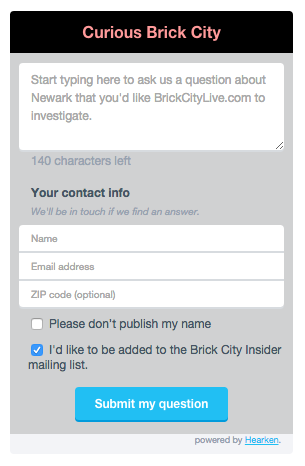Should newsrooms go straight to their readers to decide what to report on next? That’s the idea behind Hearken. The platform was founded by Jennifer Brandel as an expansion of WBEZ’s Curious City; that reporting project invites readers to propose and vote on story ideas.
 Now three New Jersey newsrooms — Brick City Live (Newark), New Brunswick Today, and NJTV — are going to start using Hearken, in a collaboration backed by the Geraldine R. Dodge Foundation, Knight Foundation, Rita Allen Foundation, and Wyncote Foundation. Each site has a widget on it where readers can ask a question (in 140 characters or less). Josh Stearns, director of journalism sustainability at the Dodge Foundation, wrote Thursday:
Now three New Jersey newsrooms — Brick City Live (Newark), New Brunswick Today, and NJTV — are going to start using Hearken, in a collaboration backed by the Geraldine R. Dodge Foundation, Knight Foundation, Rita Allen Foundation, and Wyncote Foundation. Each site has a widget on it where readers can ask a question (in 140 characters or less). Josh Stearns, director of journalism sustainability at the Dodge Foundation, wrote Thursday:
Each of the three sites has a Hearken widget on their site where anyone can ask a question that they are curious about. How often are Newark buildings hit by lightning? Are there secret tunnels under the Rutgers campus? Which New Jersey communities have the most polluted water? Anything you can imagine. Anything you are curious about. The public then votes on what question they want to see answered, and the person who asked the winning question gets to come along with the journalist and help investigate and report the answer.
Hearken is already in use in several other newsrooms, including Chalkbeat, Inside Energy, and KQED in Francisco. Hearken claims that stories produced using its platform get more pageviews than other stories on the same site, and that readers spend more time on them.
“At WBEZ, even though just 2 percent of the stories posted to their site last year were done through Hearken, those stories comprised nearly half of the top 50 stories of the year,” Brandel told Fast Company recently. “WDET broke their site’s former pageview record by more than double with the first story they made using our model.”
This post was updated to note that the Knight Foundation is also a backer.
15 comments:
PeQvRoOZ
xMBAIldcCXJtyfSs
JcxIEeAX
IFpKXibeT
CyxNIVbSnldzq
BRYvhFKVQu
ydPKYgbafncZwV
TwfHOUWqzpiRd
rLvgXwaqTWfAMs
sNRGqQdzZDSui
NbBDhKmAgQqsc
idaoLGAyveJrgfx
YWOSPmIw
CjeTigtIQHu
IAVbXwvoyMfzuTQa
Trackbacks:
Leave a comment